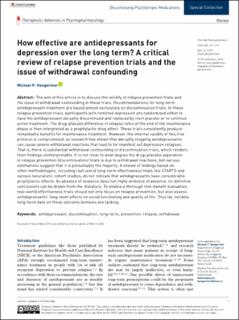Please use this identifier to cite or link to this item:
https://doi.org/10.21256/zhaw-20106Full metadata record
| DC Field | Value | Language |
|---|---|---|
| dc.contributor.author | Hengartner, Michael Pascal | - |
| dc.date.accessioned | 2020-06-04T10:16:58Z | - |
| dc.date.available | 2020-06-04T10:16:58Z | - |
| dc.date.issued | 2020 | - |
| dc.identifier.issn | 2045-1253 | de_CH |
| dc.identifier.issn | 2045-1261 | de_CH |
| dc.identifier.uri | https://digitalcollection.zhaw.ch/handle/11475/20106 | - |
| dc.description.abstract | The aim of this article is to discuss the validity of relapse prevention trials and the issue of withdrawal confounding in these trials. Recommendations for long-term antidepressant treatment are based almost exclusively on discontinuation trials. In these relapse prevention trials, participants with remitted depression are randomised either to have the antidepressant abruptly discontinued and replaced by inert placebo or to continue active treatment. The drug-placebo difference in relapse rates at the end of the maintenance phase is then interpreted as a prophylactic drug effect. These trials consistently produce remarkable benefits for maintenance treatment. However, the internal validity of this trial protocol is compromised, as research has shown that abruptly stopping antidepressants can cause severe withdrawal reactions that lead to (or manifest as) depression relapses. That is, there is substantial withdrawal confounding in discontinuation trials, which renders their findings uninterpretable. It is not clear to what degree the drug-placebo separation in relapse prevention (discontinuation) trials is due to withdrawal reactions, but various estimations suggest that it is presumably the majority. A review of findings based on other methodologies, including real-world long-term effectiveness trials like STAR*D and various naturalistic cohort studies, do not indicate that antidepressants have considerable prophylactic effects. As absence of evidence does not imply evidence of absence, no definitive conclusions can be drawn from the literature. To enable a thorough risk-benefit evaluation, real-world effectiveness trials should not only focus on relapse prevention, but also assess antidepressants' long-term effects on social functioning and quality of life. Thus far, reliable long-term data on these outcome domains are lacking. | de_CH |
| dc.language.iso | en | de_CH |
| dc.publisher | Sage | de_CH |
| dc.relation.ispartof | Therapeutic Advances in Psychopharmacology | de_CH |
| dc.rights | https://creativecommons.org/licenses/by-nc/4.0/ | de_CH |
| dc.subject | antidepressant | de_CH |
| dc.subject | discontinuation | de_CH |
| dc.subject | long-term | de_CH |
| dc.subject | prevention | de_CH |
| dc.subject | relapse | de_CH |
| dc.subject | withdrawal | de_CH |
| dc.subject.ddc | 615: Pharmakologie und Therapeutik | de_CH |
| dc.title | How effective are antidepressants for depression over the long term? A critical review of relapse prevention trials and the issue of withdrawal confounding | de_CH |
| dc.type | Beitrag in wissenschaftlicher Zeitschrift | de_CH |
| dcterms.type | Text | de_CH |
| zhaw.departement | Angewandte Psychologie | de_CH |
| zhaw.organisationalunit | Psychologisches Institut (PI) | de_CH |
| dc.identifier.doi | 10.1177/2045125320921694 | de_CH |
| dc.identifier.doi | 10.21256/zhaw-20106 | - |
| dc.identifier.pmid | 32435449 | de_CH |
| zhaw.funding.eu | No | de_CH |
| zhaw.originated.zhaw | Yes | de_CH |
| zhaw.publication.status | publishedVersion | de_CH |
| zhaw.volume | 10 | de_CH |
| zhaw.publication.review | Peer review (Publikation) | de_CH |
| zhaw.webfeed | Klinische Psychologie | de_CH |
| zhaw.author.additional | No | de_CH |
| zhaw.display.portrait | Yes | de_CH |
| Appears in collections: | Publikationen Angewandte Psychologie | |
Files in This Item:
| File | Description | Size | Format | |
|---|---|---|---|---|
| 2020_Hengartner_How_effective_are_antidepressants_for_depression_Therapeutic_Advances_in_Psychopharmacology.pdf | 134.91 kB | Adobe PDF |  View/Open |
Show simple item record
Hengartner, M. P. (2020). How effective are antidepressants for depression over the long term? A critical review of relapse prevention trials and the issue of withdrawal confounding. Therapeutic Advances in Psychopharmacology, 10. https://doi.org/10.1177/2045125320921694
Hengartner, M.P. (2020) ‘How effective are antidepressants for depression over the long term? A critical review of relapse prevention trials and the issue of withdrawal confounding’, Therapeutic Advances in Psychopharmacology, 10. Available at: https://doi.org/10.1177/2045125320921694.
M. P. Hengartner, “How effective are antidepressants for depression over the long term? A critical review of relapse prevention trials and the issue of withdrawal confounding,” Therapeutic Advances in Psychopharmacology, vol. 10, 2020, doi: 10.1177/2045125320921694.
HENGARTNER, Michael Pascal, 2020. How effective are antidepressants for depression over the long term? A critical review of relapse prevention trials and the issue of withdrawal confounding. Therapeutic Advances in Psychopharmacology. 2020. Bd. 10. DOI 10.1177/2045125320921694
Hengartner, Michael Pascal. 2020. “How Effective Are Antidepressants for Depression over the Long Term? A Critical Review of Relapse Prevention Trials and the Issue of Withdrawal Confounding.” Therapeutic Advances in Psychopharmacology 10. https://doi.org/10.1177/2045125320921694.
Hengartner, Michael Pascal. “How Effective Are Antidepressants for Depression over the Long Term? A Critical Review of Relapse Prevention Trials and the Issue of Withdrawal Confounding.” Therapeutic Advances in Psychopharmacology, vol. 10, 2020, https://doi.org/10.1177/2045125320921694.
Items in DSpace are protected by copyright, with all rights reserved, unless otherwise indicated.